'Our founding fathers gave us passports to their ideals. Let us live up to them in the next fifty'
Isn't history the reason for our general animosity towards foreigners
and our desire for self-reliance?
 History sometimes teaches us the wrong lessons. Because of
colonialism and the East India Company, which came to trade but
stayed on to rule, we became suspicious of every foreigner with
a briefcase. But there were also opportunities we could have
gained from foreigners, as elsewhere in Asia. Foreign investment
could have created jobs, reduced poverty.
History sometimes teaches us the wrong lessons. Because of
colonialism and the East India Company, which came to trade but
stayed on to rule, we became suspicious of every foreigner with
a briefcase. But there were also opportunities we could have
gained from foreigners, as elsewhere in Asia. Foreign investment
could have created jobs, reduced poverty.
The purpose of any governmental policy should be to ensure the
well being of the people. India's economic policies haven't
quite done that: 40% of the population linger just above
destitution, below a poverty line that has been drawn just this
side of the funeral pyre. Other Asian countries like China,
Korea, Malaysia, have managed to improve themselves through the
judicious use of foreign investment.
If India's rules hadn't
been so self-righteous, perhaps ordinary Indians would have been
better off. But on the other hand, one must acknowledge that the
government has done whatever it has in the face of innumerable
challenges.
Granta editor Ian Jack contends that no nation has ever
simultaneously done the following: grow its economy rapidly,
distribute its wealth equitably, and function as a democracy.
India is attempting to do all three.
That is not particularly good history. The US itself is a
good counter-example, although over a much longer period, and
though it is true that Blacks were excluded from democracy. Over
perhaps a hundred and twenty years the US has pulled off all three. Other examples might exist, for example, Germany and
Japan after the Second World War. But the comment does define
the scale of the challenge. Which of the three would you rather
suspend?
All three are interdependent. India has embarked on a course
towards all three now: previously, growth was held to be
unimportant, now we see we need it to build a future.
In the economic race, India seems to be falling far behind
others such as China.
China has done remarkably well, attracting 40% of all the
private sector investment in the world today, much of it from
the Chinese diaspora, though also from its many fans among
multinationals. India is also beginning to benefit from its
diaspora: Indian Americans are beginning to matter in American,
even though some are sectarian as well. It is an effective
community, of greater significance than immigrants from
comparable countries.
You seem to place much significance on what you call the
'Malayali Miracle' -- the fact that they have succeeded in
creating a relatively equitable society.
 Malayalis have been outward-looking for a long time. For
example, there is a Nair-san restaurant on the Ginza in Tokyo;
there is a profusion of Malayalis around India, as clerical or
professional workers, employed by MNCs and Indian business
houses. Keralites emigrate for work. But more interestingly,
Kerala is an example of what a diverse society can achieve.
Malayalis have been outward-looking for a long time. For
example, there is a Nair-san restaurant on the Ginza in Tokyo;
there is a profusion of Malayalis around India, as clerical or
professional workers, employed by MNCs and Indian business
houses. Keralites emigrate for work. But more interestingly,
Kerala is an example of what a diverse society can achieve.
There is little correlation between background and power.
Various groups -- many religions and castes-- live in comparative
harmony. In Kerala, none of the things that have been serious
disabilities in the rest of the country seem to matter: being a
woman, being of low caste, being poor, and so on.
The celebrated
"Eurocommunism", in fact, worked earlier as Kerala's Indo-
Communism; literacy, education, better wages, a greater
consciousness of workers' rights. Of course, Kerala is not
perfect, but they have done a pretty good job.
You seem to be inclined to favour greater decentralisation.
Isn't there a danger that could break up the country?
There is much to be said for "de-centering Delhi"; it is a
refreshing change for India already, with the regional parties
in the UF government, to see the national capital in the hands
of those whose roots are in the distant soil and not in the
federal ministries.
At the same time, there is little risk of
fragmentation because of the continuing role of the national
civil services, the "steel frame" of the government. Though
regionalist decentralisation could be dangerous, the devolution
of power -- accepting that answers to every question in Dharwar
are not necessarily found in Delhi -- can strengthen democracy
rather than dilute it.
In a sentence, what is your vision for the future of India?
How do you see the debates you have described working out?
 The future of India lies in the hands of Indians. I believe
they will sustain an India open to the contention of ideas and
interests within it, unafraid of the prowess or the products of
the outside world, wedded to the pluralism that is India's
greatest strength, and determined to liberate and fulfill the
creative energies of its people. Such an India can make the 21st
century her own.
The future of India lies in the hands of Indians. I believe
they will sustain an India open to the contention of ideas and
interests within it, unafraid of the prowess or the products of
the outside world, wedded to the pluralism that is India's
greatest strength, and determined to liberate and fulfill the
creative energies of its people. Such an India can make the 21st
century her own.
Any closing thoughts to your readers?
I hope what I have to say echoes many of their own thoughts.
I believe strongly that the kind of society India has tried to
create in the last fifty years -- pluralist, democratic, all-
inclusive and adaptable -- is well worth celebrating. Our
nationalism is not one of language, or race, or blood; our
founding fathers gave passports to their ideals. Let us try to live up to them in the next fifty.
RELATED LINK:
'There's a lot we have to overcome, from political paralysis to corruption'
|

